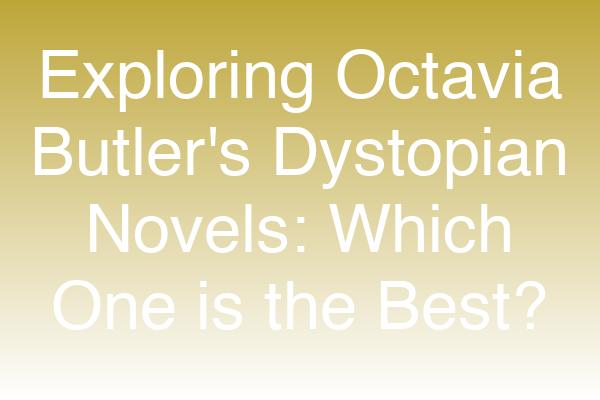
Introduction
Octavia Butler is a name synonymous with groundbreaking science fiction and dystopian literature. Her works challenge societal norms and explore complex themes of race, gender, and humanity's future. As readers delve into her thought-provoking narratives, a common question arises: Which of Octavia Butler's dystopian novels is the best? In this blog post, we will explore her most notable dystopian works, examining their themes, characters, and lasting impact, ultimately helping you determine which one stands out as the best.
The Legacy of Octavia Butler
Before we dive into her novels, it’s essential to understand Butler's influence on the genre. Born in 1947, Butler faced numerous challenges as a Black woman in a predominantly white and male literary landscape. Her unique perspective allowed her to craft stories that resonate with a diverse audience, making her a pivotal figure in speculative fiction. Butler's ability to blend social commentary with imaginative storytelling has earned her numerous accolades, including the Hugo and Nebula Awards.
A Look at Butler's Dystopian Novels
1. Parable of the Sower (1993)
Overview: Set in a near-future America ravaged by climate change and social chaos, Parable of the Sower follows Lauren Olamina, a young woman with hyper-empathy, who can feel the pain of others. As her community collapses, Lauren embarks on a journey to find safety and create a new belief system called Earthseed.
Themes: This novel explores themes of survival, community, and the power of belief. Butler's portrayal of a dystopian society reflects contemporary issues such as environmental degradation and social inequality.
Why It Stands Out: Parable of the Sower is often hailed as Butler's most relevant work today, given the ongoing discussions around climate change and societal collapse. Its protagonist's resilience and vision for a better future resonate deeply with readers.
2. Kindred (1979)
Overview: While not a traditional dystopian novel, Kindred blends science fiction with historical fiction as it follows Dana, a Black woman from the 1970s who is inexplicably transported back to the antebellum South. She must navigate the brutal realities of slavery while ensuring her own survival and that of her ancestors.
Themes: The novel tackles themes of racism, power dynamics, and the impact of history on identity. Butler's exploration of time travel serves as a powerful metaphor for the enduring legacy of slavery in America.
Why It Stands Out: Kindred is often considered Butler's most accessible work, making it a favorite among both casual readers and scholars. Its unique premise and emotional depth challenge readers to confront uncomfortable truths about American history.
3. Fledgling (2005)
Overview: In Fledgling, Butler introduces readers to Shori, a genetically modified vampire who awakens with no memory of her past. As she navigates her identity and the complexities of her existence, Shori must confront both her own nature and the prejudices of those around her.
Themes: This novel delves into themes of identity, race, and the nature of humanity. Butler's portrayal of vampires serves as an allegory for societal issues, including discrimination and the struggle for acceptance.
Why It Stands Out: Fledgling is notable for its fresh take on the vampire genre, infusing it with Butler's signature social commentary. Its exploration of race and identity makes it a compelling read in today's context.
Which One is the Best?
Determining the "best" of Octavia Butler's dystopian novels ultimately depends on personal preference and what themes resonate most with the reader. However, Parable of the Sower often emerges as a frontrunner due to its timely relevance and profound exploration of hope amidst despair. Its powerful narrative encourages readers to reflect on their role in shaping the future, making it a must-read for anyone interested in dystopian literature.
Conclusion
Octavia Butler's dystopian novels offer a rich tapestry of themes and narratives that challenge readers to think critically about society and humanity's future. Whether you are drawn to the harrowing realities of Kindred, the hopeful vision of Parable of the Sower, or the unique perspective of Fledgling, Butler's works are essential reading for anyone interested in speculative fiction.
Which of Butler's novels resonates with you the most? Share your thoughts in the comments below, and let’s celebrate the legacy of this remarkable author together!
By following these guidelines, this blog post not only provides a comprehensive overview of Octavia Butler's dystopian novels but also engages readers and optimizes for search engines, ensuring it reaches a wider audience.